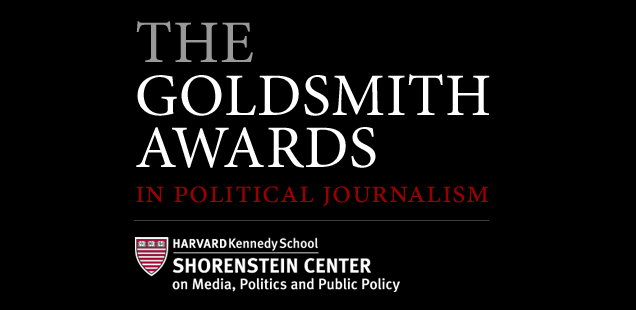Finalists include: The Boston Globe, Miami Herald, The Post and Courier, ProPublica and NPR, Reuters and The Wall Street Journal.
January 29, 2015 — Six finalists for the Goldsmith Prize for Investigative Reporting have been announced by the Shorenstein Center on Media, Politics and Public Policy at Harvard’s Kennedy School of Government. The winner of the Goldsmith Prize for Investigative Reporting will be announced at an awards ceremony on March 3, 2015, at the Kennedy School.
The Goldsmith Prizes are underwritten by an annual gift from the Goldsmith Fund of the Greenfield Foundation. The Investigative Reporting Prize, which carries a $10,000 award for finalists and $25,000 for the winner, is intended to recognize and encourage journalism which promotes more effective and ethical conduct of government, the making of public policy, or the practice of politics by disclosing excessive secrecy, impropriety and mismanagement, or instances of particularly commendable government performance.
“This group of Goldsmith Prize Finalists includes newspapers of different sizes, new media, radio, and a news service – which indicates that high quality work is being done on every platform,” said Alex S. Jones, director of the Shorenstein Center.
The six finalists for the 2015 Goldsmith Prize for Investigative Reporting are:
The Boston Globe
Thomas Farragher, Jonathan Saltzman, Jenn Abelson, Casey Ross and Todd Wallack
“Shadow Campus”
The Boston Globe found that in America’s college capital, illegally overcrowded student apartments owned by profit-driven landlords are rampant, placing the health and safety of thousands of undergraduates at risk while city officials have done nothing to respond to this lawless behavior.
Miami Herald
Carol Marbin Miller, Audra Burch, Mary Ellen Klas, Emily Michot, Kara Dapena and Lazaro Gamio
“Innocents Lost”
The Miami Herald explored how more than 500 children died of abuse or neglect over a seven-year period after falling through Florida’s child welfare safety net, largely as a result of a misguided effort to reduce the number of foster children while simultaneously slashing services for troubled families. The series prompted immediate reforms, including the most far-reaching overhaul of child welfare laws in Florida’s history.
The Post and Courier
Jennifer Berry Hawes, Natalie Caula Hauff, Doug Pardue and Glenn Smith
“Till Death Do Us Part”
The Post and Courier’s five-part series examined South Carolina’s ranking as one of the deadliest states in the nation for women at the hands of men. The series revealed that more than 300 women were killed by their husband or boyfriend in a decade, while the state’s leaders did little to stem the violence. The series showed a state awash in guns, saddled with ineffective laws and lacking in resources for victims of domestic violence. The investigation spurred national discussion, pressured state legislators into drafting and fast-tracking domestic violence reform laws, and led to the appointment of a statewide taskforce.
ProPublica and NPR
Justin Elliott, Jesse Eisinger and Laura Sullivan
“The Red Cross’ Secret Disaster”
ProPublica and NPR found that the Red Cross had put public relations ahead of relief services and had been serially misleading about its use of donations. The series showed how the charity had failed to deliver basic aid after several recent major disasters, including Superstorm Sandy, leaving victims in distress, even though it had received a deluge of support from Americans eager to help. After the series ran, the Red Cross had to withdraw its claims about its spending and Iowa Senator Charles Grassley initiated an investigation.
Reuters
Joan Biskupic, Janet Roberts and John Shiffman
“The Echo Chamber”
Reuters examined the U.S. Supreme Court’s docket to scrutinize its most secretive process – how the justices select which cases they will hear. What Reuters found is changing how people view the concept of equal access to justice in the U.S. A small group of lawyers and their clients – typically the nation’s largest corporations – have secured a special entry point to the court, giving them a disproportionate chance to influence the law.
The Wall Street Journal
Christopher S. Stewart, Christopher Weaver, John Carreyrou, Tom McGinty, Anna Wilde Mathews, Rob Barry and staff
“Medicare Unmasked”
The Wall Street Journal uncovered Medicare abuses that cost U.S. taxpayers $60 billion. Using 9.2 million newly-disclosed billing records, the Journal uncovered bogus, unnecessary, and harmful practices. After pieces in the series were published, the federal agency overseeing Medicare rejected industry proposals to cover additional high-cost tests for drugs rarely abused by seniors; triggered the departure of a high-profile laboratory CEO; and led some cancer patients to stop using a dangerous drug lucrative for and widely prescribed by doctors.
Judges for the Goldsmith Investigative Reporting Prize were: Mike Greenfield, Greenfield Foundation; Lorelei Kelly, Fellow, XLab, New America Foundation; Susan Smith Richardson, Editor and Publisher, The Chicago Reporter; David Shribman, Executive Editor of the Pittsburgh Post-Gazette; and Paul C. Tash, Chairman and CEO, Times Publishing Company.
The Goldsmith Awards Ceremony
Presentation of the Goldsmith Prize for Investigative Reporting, the Goldsmith Book Prizes and the Goldsmith Career Award for Excellence in Journalism.
Tuesday, March 3, 2015, 6:00 p.m.
John F. Kennedy Jr. Forum, Harvard Kennedy School
79 JFK Street, Cambridge, MA
The ceremony will also be streamed online.


